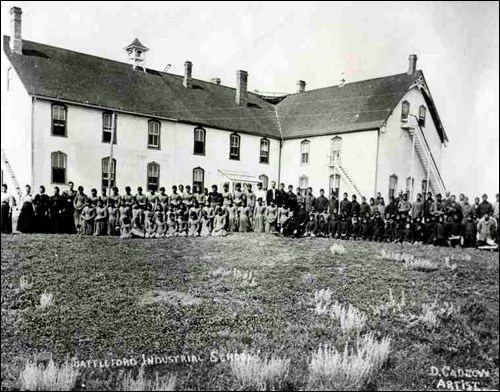June 11, 2008 was a historic day for all Canadians. On that day, the prime minister, on behalf of the Government of Canada, formally apologized in the House of Commons to former students, their families and communities for Canada's role in the operation of the infamous residential schools.
From the 1870s until the closure of the last school in 1996, the government-funded, church-run schools enrolled more than 150,000 First Nations, Métis and Inuit children. Though the schools were welcomed by some chiefs for the education they would bring to their people, the schools have since taken on more sinister associations.
Children were commonly put in the schools against their parents' wishes, and students were forbidden to speak their native language or practice their culture. It was only after 1948, for example, that students at residential schools were allowed to return to their families for Christmas.
The schools were also responsible for a wide variety of serious problems, associated at least with government disinterest and at worst, criminal negligence. Schools were often ill-equipped and poorly funded to the point of being dangerous. In the 1950s, many schools received so little funding they relied on the forced labour of the students.
They are also associated with an ugly history of abuse and brutality. One report, from 1907, indicated a mortality rate of between 30 and 50 per cent in western Canadian schools over five years. Another study in the early 1920s revealed similar numbers, with extremely high rates of tuberculosis. Investigations after schools had closed revealed a long history of physical, psychological and sexual abuse by school officials.
One survivor, in an interview with the CBC, put it succinctly: "A lot of us did get an education, that was the good part. It's the way it was done back then, when kids were taken away from their families, at the age of five, six, seven."
But many were not so lucky. Teachers were often poorly-trained, with little understanding of the local First Nation's culture and insufficient resources. The "education" in many cases, amounted to nothing more than destruction of the students' own culture. Some survivors have said the abuse they suffered at the schools had the opposite effect, leaving them unable to function in the outside world.
Saskatchewan had around 20 residential schools. Two of them were located nearby - the Battleford Industrial School was open from 1883 to 1914 and the Thunderchild Residential School in Delmas was open from 1901 to 1948. Both schools were run by the Roman Catholic Church, though schools in Saskatchewan were run by a variety of Christian denominations. The last residential school in Canada to close, the Gordon Residential School, shut its doors in 1996.
One local high-profile residential school survivor is Fred Sasakamoose, the first aboriginal NHL player who also played for the North Battleford Beavers in 1960-61. Sasakamoose has spoken about the treatment he received at residential schools, saying that it left him feeling like he "didn't belong in this world."
One year after the prime minister's apology, the Indian Residential Schools Truth and Reconciliation Commission was officially established as a result of the Indian Residential Schools Settlement Agreement between churches, former students, the Government of Canada, the Assembly of First Nations and other aboriginal organizations. The TRC's stated purpose is to help Canadians learn the truth about Indian Residential Schools and encourage the rebuilding of relationships damaged by residential schools.
The TRC has organized seven national events. Winnipeg hosted an event in 2010, Inuvik and Halifax in 2011 and most recently, Saskatoon hosted an event from June 21 to 24 2012. Upcoming events are in Montreal, Vancouver and Alberta. In addition to the national events though, there are many "community hearings" being held throughout Canada. North Battleford has been selected as one of the 12 Saskatchewan communities for a community event, which will be hosted by BTC Indian Health services along with committee representatives from Battlefords Agency Tribal Chiefs and the Prairie North Health Region.
The community hearing in North Battleford will start at 8 a.m. Sept. 10 at the Don Ross Centre with a pipe ceremony and will finish at 4:30 p.m. Sept. 11. Both days, events run from 9 a.m. to 4:30 p.m., with an outdoor talent show to take place Sept. 10 to 6 p.m. Lunch and nutrition breaks will be provided, and participants will have health supports available to them.
Anyone who would like to share an experience or perspective about the Indian Residential Schools, their impacts or about reconciliation is invited to attend the community events and meet with the statement gathering team to have their statement recorded. Other resources, from photographs or other residential school ephemera to written, audio or video statements to artistic expressions of truth or reconciliation are welcome.
Like all the other TRC commission events the North Battleford event will be webcast live internationally.
For more information about the TRC or to see video from other events, visit the commission's website at www.trc.ca. For more information about the North Battleford event, contact Sonya Whitecalf, North Battleford community co-ordinator at 937-6751 or by email at swhitecalf@btchealth.org. To pre-register to provide a statement, contact BTC Indian Health Services at 937-6700 or Kimberly Quinney, Saskatchewan regional liaison at 665-4991 or 371-3403.



